Arkansas Supreme Court Strikes Down Voter ID Law
A victory for the opponents of Voter ID laws that will be untouchable by the Supreme Court.
The highest Court in Arkansas has struck down that state’s Voter ID law, but it has done so in a way that makes it unlikely that the U.S. Supreme Court will be inclined to intervene to overturn the decision:
The Arkansas Supreme Court struck down the state’s voter identification law on Wednesday, saying that it would set a new requirement for voting beyond those listed in the state’s Constitution.
The ruling came less than three weeks before the Nov. 4 election in a state where there are several close contests this year, including for governor and the United States Senate. A day earlier, a federal appeals court ruled that Texas could enforce its voter identification requirements in the November election.
The Arkansas ruling found that the law went beyond the four qualifications for voting in the state Constitution. The Constitution says that a voter must be a United States citizen, a resident of the state, at least 18 years old and lawfully registered to vote in the election. “These four qualifications set forth in our state’s Constitution simply do not include any proof-of-identity requirement,” the ruling said.
The ruling was written by Associate Justice Donald L. Corbin. A concurring opinion, written by Associate Justice Courtney Hudson Goodson, agreed that the law should be struck down, but for a different reason. Justice Goodson wrote that the law failed to receive a two-thirds majority vote in the Legislature, which was a requirement to amend laws “initiated by the people,” she argued.
Gov. Mike Beebe, a Democrat, vetoed the voter identification law last year, but state lawmakers overrode the veto. Earlier this year, a judge found that the state’s law was unconstitutional but said he would not block its enforcement because there was not enough time to do so before the primary election in May.
The law required all voters to present photo identification. In the past, the state had required poll workers to ask for identification, but voters could still cast a ballot if they did not have it. Under the new law, voters who did not have identification could cast provisional ballots, but they would not be counted unless the voters returned to the county clerk or election commission by noon the Monday after the election with proof of identity.
Because this decision is based entirely on state law and the state Constitution, there doesn’t seem to be any basis upon which this matter could be appealed to the U.S. Supreme Court. While the Justices have the final word on Federal law and the U.S. Constitution, matters that are solely covered by state law and the Constitutions of the individual states are solely within the final jurisdictions of the highest court of each particular state. So, unless there is a Federal law issue that could be raised here, and like Rick Hasan I don’t see one, then this would appear to be the final word on Arkansas’s law. The only alternative for advocates of Voter ID law in Arkansas at this point would be to amend the state’s Constitution would be to amend the state Constitution to give the legislature the authority to add additional requirements to what voters must comply with in order to be able to vote. So, absent that occurrence, this is a complete victory for the opponents of Voter ID, although it is important to note that this decision does not address the “disparate impact” arguments that have been the basis for various Federal Court rulings on this issue.
Incidentally, this outcome does potentially suggest a new strategy for those opposed to Voter ID laws. State Constitutions vary from state to state, and different state Supreme Court’s will interpret things differently, but if the legal arguments are set forth in terms of being illegitamite not because of some argument under the Voting Rights Act that doesn’t seem likely to succeed at the Supreme Court at the present time, but because they create qualifications for voting not authorized by the state Constitution, then challengers may have a new route to proceed to challenge these laws. Obviously, that won’t help very much where the Supreme Court is dominated by the same party that passed the law, such as Texas, but it it may be an avenue worth pursuing. Additionally, it suggests that attempting to amend state Constitutions either bar Voter ID laws altogether or, probably more likely, set forth explicit requirements in the state Constitution that any such law must comply with certain criteria, such as being easily available, free, and non-discriminatory toward people who have been voting for a long period of time but may not be able produce the documents necessary to get proper identification, then that could blunt the impact of the laws that they complain about. I don’t know that this is any more feasible than the Federal Court route, but it’s worth considering.
Here’s a link to the opinion.
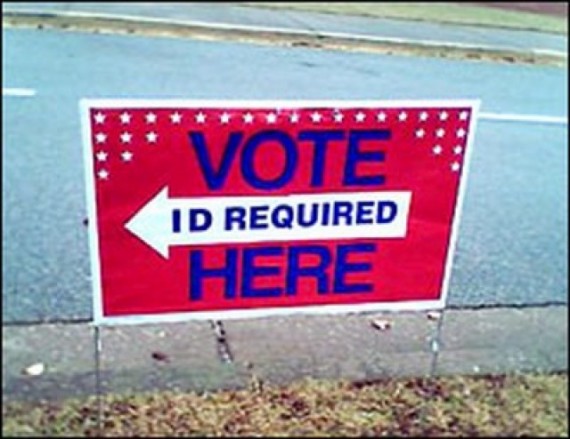

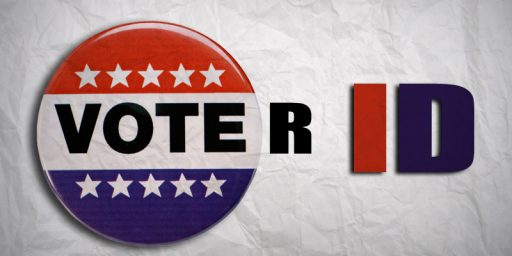
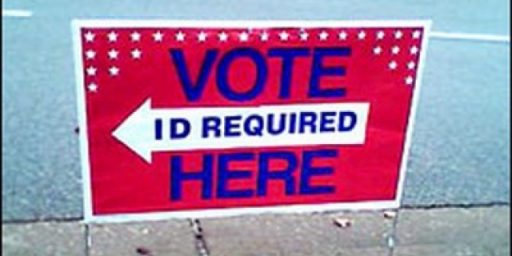
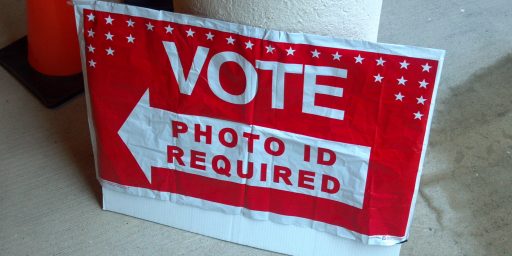

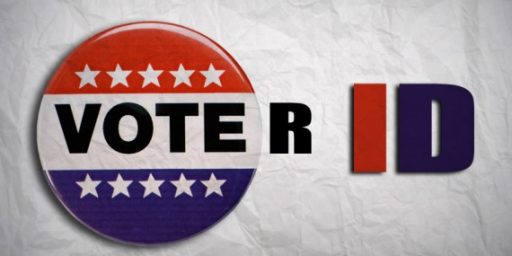
Who knew it could be so difficult to solve a problem that doesn’t exist.
And how does one go about proving these things?? Why, with an ID of course!!
@Jack:
Take a look at your drivers license. See where it notes you are a US citizen?
Of course you don’t.
See where it says your state is your primary state of residence?
This does seem a clear victory for voting rights and it might be an effective strategy for defeating these voter supression schemes in future.
Of course the vote supressors will respond by amending their constiutions if they can, a la the anti-SSM gang…
@Jack: I hope there is more to the decision what has been quoted, because that doesn’t make any sense. A valid driver’s license is proof of age. I use it relatively frequently for such.
@PD Shaw: I would be wrong, the majority simply concluded that asking identification was an additional requirement (Is requiring someone to sign their name similarly inappropriate?). From the concurrence:
@Davebo: In VA, I cannot get a driver’s license without showing a birth certificate, which also shows citizenship.
Additionally, I cannot vote in VA with another state’s driver’s license. So yes, my DL proves citizenship, residency requirement, and age.
Once compared to a registration roster, an AR driver’s license would prove everything needed to meet the constitutional requirements.
http://www.washingtonpost.com/blogs/wonkblog/wp/2014/10/14/whites-are-more-supportive-of-voter-id-laws-when-shown-photos-of-black-people-voting/
@Jack:
The Constitution says I have to provide a drivers license to vote?
@Jack:
“In VA, I cannot get a driver’s license without showing a birth certificate, which also shows citizenship.”
So people who are resident aliens with green cards cannot get VA driver’s licenses? I don’t think that is correct.
@C. Clavin: You and I both know, that rules for voting are set up by the state. So, yes, the 10th amendment does allow for you to have to show ID to vote.
@Moosebreath:
http://www.dmv.state.va.us/drivers/#eligibility.asp
At any age, as a first time driver, you will be required to provide documents to prove identity, legal presence, Virginia residency, and, if you have one, Social Security number. Use the interactive document guide to determine which documents you will need to bring to DMV when you apply, or refer to “Acceptable Documents for Obtaining a Driver’s License or Photo ID Card” (DMV 141)
If you are a non-resident temporarily living in Virginia, you may drive with your home state or country driver’s license and license plates for no more than six months. This does not apply to commercial vehicle drivers. If you become gainfully employed, you are required to hold a Virginia driver’s license.
Prior to getting my VA driver’s License, I had an OH license. When I went to the DMV I had to show a birth certificate, Social Security number (Military ID sufficed at the time and also proved identity).
@Jack:
Immaterial. You’re expanding the Arkansas requirement beyond what it mandates.
Arkansas would validate citizenship at the time of registration, and only citizens would be allowed to register in the first place. There is no room (under the Arkansas constitution as currently written) to validate citizenship again. The person proves to the state’s satisfaction that he/she is a citizen when they register. It’s a one time deal.
@Jack:
But that birth certificate doesn’t have to be American. I have lots of friends who have New York State or California drivers licenses but who aren’t US citizens and who have birth certificates from France, Germany, China, Brazil, Israel, Australia, Japan, South Africa, Nigeria, etc. etc.
@C. Clavin:
Hey, strict construction. What are you gonna do?
@Jack:
The key words in what you quoted are “legal presence”. Looking around VA’s DMV website takes you to this page, which lists the documents which need to be brought in if you are a US citizen, a legal permanent resident, a conditional resident alien, a holder of a valid, non-expired, nonimmigrant visa status, a refugee, etc.
So a VA driver’s license does not by itself equate to proof of citizenship or eligibility to vote.
@Jack:
The rules for voting are set up by the states within the confines of certain limitations placed on them by the 15th, 19th, 24th and 26th amendments. As each of these amendments establishes that there is a constitutionally protected right to vote, the 14th amendment also comes into play with regard to how states formulate and enforce their election laws.
The constitution (Article 1, section 4) does grant to states the power to regulate the time, place and manner of holding elections, but it also gives Congress the power to override those state level regulations in that same section. The 10th Amendment is not implicated here, at all.
Moreover, the 10th Amendment does not do what you guys think that it does. It’s neutered, intentionally and by design of the framers.
@Jack:
You know, it’s amazing that only about 50 years ago, in The South, so many states could make it so difficult for Black citizens to register to vote. How could that have happened when the Constitution seems to be so clear on the process? Wasn’t it just as easy then, as it is now, for Black people to get a state-approved voter ID?
@Jack:
But you just quoted the Constitution?
@Moosebreath: A driver’s license would still be proof of age and residency. I’m not sure I understand the drift of the thread here. If the driver’s license isn’t proof of all four issues, it cannot be proof of two of them? The state cannot require someone to prove less than all four requirements? It should require the driver’s license, plus other documentation?
I think it reads like a crappy decision, bolstering the view that election laws should not be changed too close to an election. Maybe a better explanation could have been written with more time.
@PD Shaw:
The verbiage of Article 3 of the Arkansas constitution is illustrative here:
“Elections shall be free and equal. No power, civil or military, shall ever interfere to prevent the
free exercise of the right of suffrage; nor shall any law be enacted whereby such right shall be
impaired or forfeited, except for the commission of a felony, upon lawful conviction thereof. ”
In other words, the constitution mandates 4 criteria, and only 4 criteria, which may be imposed to qualify access to voting. All 4 of those criteria are satisfied when the citizen demonstrates to the state’s satisfaction that he/she meets them during the registration process. The mere presence of his/her name on the voter rolls is prima facie evidence that the criteria mandated by the AR constitution have been met.
A statute which seeks to force the voter to redemonstrate eligibility when he/she has already done during the registration process is unnecessary and redundant. Since such a statute can serve as an impairment of access to the right to vote, and the state is explicitly debarred from enacting any such statute by its constitution, the statute in question unavoidably fails.
@PD Shaw:
I am refuting the comment said by Jack, which reads “In VA, I cannot get a driver’s license without showing a birth certificate, which also shows citizenship.” (emphasis added).
This is slightly off-topic,as the case is federal and not state-level, but Richard Posner says all that needs to be said about Voter ID laws as they are currently written, and the people who advocate them (Posner is of course the judge who wrote the decision affirming Indiana’s Voter ID law, a decision he now regrets:
@PD Shaw: It’s possible to live in one state and have a driver’s license from another. Indeed, it’s not even illegal.
So no, a DL does not prove residency.
The GOP can’t win fair elections anymore, so now they’re trying to cheat. Everybody knows that. Posner lays it out:
http://freethoughtblogs.com/dispatches/2014/10/15/judge-posner-destroys-conservative-claims-again/
@Electroman: Illinois law requires one to be an Illinois resident to obtain an Illinois driver’s license. Are you suggesting someone would be dumb enough to try to use an out-of state license to vote (in states that require one)?
@HarvardLaw92: I am not a strict constructionist, and neither apparently were three of the seven members of the Arkansas Supreme Court.
Imagine a state that solely requires a photo ID to get a state issued photo ID. That would screw over a lot of people. So states have reasonably decided that there are multiple ways to verify identity outside of having a photo ID. What voter ID proponents don’t understand is that means every state is going to have some sort of internal logic that makes photo-ID voting problematic. Without a national ID or the state issuing photo-ID at birth, the voting restrictions will always seem ridiculous and arbitrary. Photo-ID is a pretty recent phenomenon, democracy isn’t.
What kills me is that so called libertarians and small government people don’t take this seriously. Even though there is no good remedy for being unconstitutionally denied the right to vote. It’s not like you can get a do over election… or like you get to carry your lawsuit papers around for the next time they try to screw you out of voting. Changes to voting requirements that make voting harder HAVE to be taken very seriously.
Historically in America the integrity of the ballot has been violated by the vote counters and the poll workers. The fact that this never dawns on so-called conservatives (and don’t get me started on how so many of them seem married to the idea that local law enforcement can never be oppressive or wrong) and other people running around crying about freedom is funny. But it’s not really unexpected. The idea that the system automatically works is rooted in the unexamined privilege required to be even remotely right-leaning.
@PD Shaw: Never once does it say you must have a valid Illinois ID to register to vote.
This is done so that college students currently residing in the state and newly moved residents are disenfranchised because of a recent move. So no you don’t have to be ” dumb enough to try to use an out-of state license to vote” you can legally register as a resident with an out of state license. Check up on the requirements for voter registration.
Back when I was young and dinosaurs ruled the earth, in Washington State voters needed to show their voter registration cards to vote. As time went on and residents of the state increased their mobility by moving to other areas–and those areas incorporated and reincorporated into larger and more complex poling areas, the state dropped the requirement because having to appear at one office at the county seat became too cumbersome a ritual for even the state to put up with. That and the fact that in-person voter fraud is very low.
Of course, Washington State has lots of very small precincts (even in large cities) that help to keep in-person voter fraud low. In places where the state in its august wisdom has decided that there should only be a few places to vote, experiences may differ. Or, the state intends for some people not to vote.
@PD Shaw:
Nor, on a typical basis, am I, but there is no wiggle room in that section which I can see. The state is debarred not only from any act which might prevent the free exercise of suffrage, it is also debarred from passing any laws which even impair it. That section is in no way vague or unclear – you can’t prevent people from voting, regardless of the means that you employ, and you can’t pass laws which hinder them from being able to vote with the exception of losing that right upon conviction of a felony.
There is just no wiggle room there. The AR constitution is remarkably clear, and remarkably broad, in the scope of the limitations that it places on the state in this regard. Short of amending their state constitution, it doesn’t seem to me that there is much the state can do here in furtherance of an ID scheme.